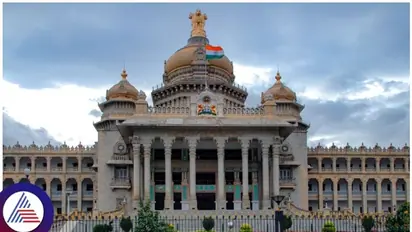Pro-Kannada laws under legal tussle in Karnataka: Is the government becoming helpless?

Synopsis
Karnataka’s pro-Kannada policies face mounting legal challenges, hindering efforts to promote the Kannada language and culture. Laws on education, signage, and advocacy face opposition, sparking debates over individual rights and cultural preservation as legal battles continue to delay implementation.
In Karnataka, efforts to promote the Kannada language and culture face increasing resistance as legal disputes complicate the implementation of pro-Kannada policies. From language education mandates to commercial signage regulations, these initiatives are being challenged in court by those who argue that the enforcement of Kannada-centric laws infringes on individual rights and freedoms. This ongoing legal tussle raises questions about the state’s ability to foster a Kannada-friendly environment amidst constant judicial scrutiny.
For years, the state government has promoted the "Kannada Nadu-Nudi" initiative, aimed at strengthening Kannada culture and language. However, experts argue that these efforts may not progress smoothly without widespread public support. They contend that if people are motivated to contribute voluntarily, the impact on preserving Kannada culture could be significant. However, when forced, these initiatives have faced resistance and legal obstacles. Activists assert that implementing such policies via law often leads to a flurry of lawsuits, stalling progress and placing the government in a challenging position.
Mumbai influencer who insulted Kannadigas faces backlash, issues apology after police action (WATCH)
Education in Kannada medium
In 1989, the Karnataka government passed a law mandating that students from grades 1 to 5 must study in the Kannada medium. However, many parents contested this requirement, arguing for the right to choose the language of instruction. This led to a legal battle that ultimately ended in 2013 when the Supreme Court upheld a Karnataka High Court order stating that the government lacked the authority to enforce such a mandate. As a result, the attempt to make Kannada-medium education compulsory in primary schools failed, marking an early setback in the state’s pro-Kannada campaign.
Legal hurdles to Kannada language learning in Schools, colleges
The Kannada Language Learning Act of 2018 aimed to make Kannada a mandatory language for students in all schools across Karnataka. However, this law also faced a legal roadblock. A Class 4 student filed a petition in the High Court challenging the Act, arguing that it restricted educational freedom. The case remains pending, and the implementation of the Act has stalled.
Are Kannadigas losing ground in Bengaluru's job market?
Similarly, the state’s 2021 mandate requiring students in state degree colleges to learn Kannada has also faced resistance. A Public Interest Litigation (PIL) was filed by the Sanskrit Bharati (Karnataka) Trust and the Mahavidyalaya Sanskrit Professors Association, challenging the order. The High Court responded by allowing students to opt out of Kannada if they wished, putting yet another pro-Kannada law in limbo.
Objections to Kannada nameplates
Efforts to enforce Kannada signage on commercial establishments have also sparked controversy. The state had initially mandated that all businesses use Kannada on their nameplates. However, organizations such as the Indian Retailers Association filed petitions against this directive. In response, the Karnataka High Court quashed certain enforcement notices issued by local bodies like the BBMP (Bruhat Bengaluru Mahanagara Palike), citing procedural issues. In an attempt to address these concerns, the government amended the Kannada Language Integrated Development Amendment Act in 2022, mandating that 60% of signboards in commercial and other establishments must display Kannada. The issue is now awaiting further judgment in the High Court.
Kannada organizations supporting Kannada-related issues, such as land, water, and language rights, have also faced legal restrictions on holding bandhs (strikes). Legal challenges have led to restrictions on such demonstrations, often resulting in the cancellation of planned bandhs. This, some argue, restricts the voice of Kannada advocacy groups and limits their ability to mobilize public support for Kannada causes.
Growing trend of North Indian migrants insulting Kannadigas on social media raises concerns
Critics argue that Karnataka’s attempts to promote Kannada through legislation may ultimately be undermined if these laws cannot withstand judicial review. While supporters emphasize the need for a legal framework to safeguard Kannada, opponents believe such measures violate constitutionally guaranteed rights. Legal experts acknowledge the right to question government policies but stress that such measures should be crafted with constitutional protections in mind.
As the state’s pro-Kannada laws continue to face legal challenges, many wonder if Karnataka’s efforts to preserve its language and culture are being weakened.
Stay updated with the Breaking News Today and Latest News from across India and around the world. Get real-time updates, in-depth analysis, and comprehensive coverage of India News, World News, Indian Defence News, Kerala News, and Karnataka News. From politics to current affairs, follow every major story as it unfolds. Download the Asianet News Official App from the Android Play Store and iPhone App Store for accurate and timely news updates anytime, anywhere.